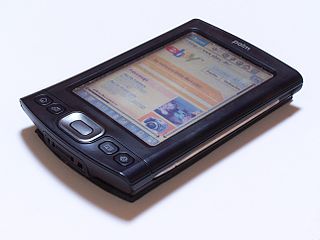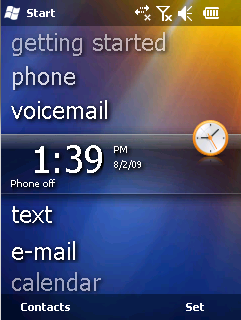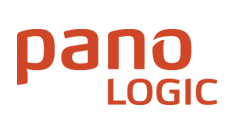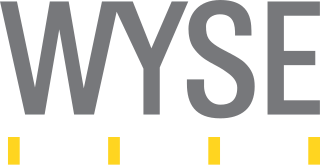
A personal digital assistant (PDA) is a multi-purpose mobile device which functions as a personal information manager. Following a boom in the 1990's and 2000's, PDA's were mostly displaced by the widespread adoption of more highly capable smartphones, in particular those based on iOS and Android in the late 2000's, and thus saw a rapid decline.

Windows Mobile was a mobile operating system developed by Microsoft for smartphones and personal digital assistants.

ActiveSync is a mobile data synchronization app developed by Microsoft, originally released in 1996. It synchronizes data with handheld devices and desktop computers.
Remote administration refers to any method of controlling a computer or other Internet-connected device, such as a smartphone, from a remote location. There are many commercially available and free-to-use software that make remote administration easy to set up and use. Remote administration is often used when it's difficult or impractical to be physically near a system in order to use it or troubleshoot it. Many server administrators also use remote administration to control the servers around the world at remote locations. It is also used by companies and corporations to improve overall productivity as well as promote remote work. It may also refer to both legal and illegal remote administration.
Push email is an email system that provides an always-on capability, in which when new email arrives at the mail delivery agent (MDA), it is immediately, actively transferred (pushed) by the MDA to the mail user agent (MUA), also called the email client, so that the end-user can see incoming email immediately. This is in contrast with systems that check for new incoming mail every so often, on a schedule. Email clients include smartphones and, less strictly, IMAP personal computer mail applications.
BlackBerry Enterprise Server designates the middleware software package that is part of the BlackBerry wireless platform supplied by BlackBerry Limited. The software plus service connects to messaging and collaboration software on enterprise networks to redirect emails and synchronize contacts and calendaring information between servers, desktop workstations, as well as mobile devices. Some third-party connectors exist, including Scalix, Zarafa, Zimbra, and the Google Apps BES Connector, although these are not supported by BlackBerry Limited. As of June 2018, BlackBerry Enterprise Server has been renamed to BlackBerry Unified Endpoint Manager (UEM).

Desktop virtualization is a software technology that separates the desktop environment and associated application software from the physical client device that is used to access it.
In computing, the term remote desktop refers to a software- or operating system feature that allows a personal computer's desktop environment to be run remotely from one system, while being displayed on a separate client device. Remote desktop applications have varying features. Some allow attaching to an existing user's session and "remote controlling", either displaying the remote control session or blanking the screen. Taking over a desktop remotely is a form of remote administration.
This page is a comparison of notable remote desktop software available for various platforms.
Monsoon Multimedia was a company that manufactured, developed and sold video streaming and place-shifting devices that allowed consumers to view and control live television on PCs connected to a local (home) network or remotely from a broadband-connected PC or mobile phone. It was one of 5 major transformations initiated by Prabhat Jain, a Silicon Valley entrepreneur with 5 undergraduate and post graduate engineering degrees from Cal Berkeley and Univ of Vienna, Austria. On the even of Cisco acquiring Monsoon in 2017, EchoStar, the new parent of Sling sued Monsoon for patent infringement, having obtained confidential information about the date of the acquisition by Cisco from a Monsoon employee under murky circumstances. Monsoon settled the lawsuit by agreeing not to sell its products in the USA simply because it did not have the legal funds to fight mighty Echostar's legal maneuvers. EchoStar thus successfully removed its only competitor from the market place. This meant Monsoon's death knell.
Mobile device management (MDM) is the administration of mobile devices, such as smartphones, tablet computers, and laptops. MDM is usually implemented with the use of a third-party product that has management features for particular vendors of mobile devices. Though closely related to Enterprise Mobility Management and Unified Endpoint Management, MDM differs slightly from both: unlike MDM, EMM includes mobile information management, BYOD, mobile application management and mobile content management, whereas UEM provides device management for endpoints like desktops, printers, IoT devices, and wearables as well.
Ericom Software, Inc. is a Closter, New Jersey-based company that provides web isolation and remote application access software to businesses.

Pano Logic was a manufacturer of devices which present virtual desktops to the end user with no local processing power. They describe this concept as "zero client". This is perceived as offering benefits in end-user support and in power provision to desks. OEM versions have been included in displays from some vendors, allowing a single unit to be deployed. The company failed in October 2012. In March 2013, Propalms announced they had acquired the rights to support Panologic customers, and will "help transition the customer base to a new platform".
A Nirvana Phone was a marketing phrase coined by Citrix for a smartphone that could be docked with external displays and keyboards to create an alternative desktop or laptop computer system. It was to define a new category of mobile device with a capability beyond a conventional smartphone computer. The NirvanaPhone provides the processor, storage media, display adapter, communication channels, and operating system. The docking station provides power, and connectivity. To be useful the NirvanaPhone differs from a simple smartphone by having significant processing power, video output at high resolution, plus keyboard and mouse input. A smartphone is generally accepted as a device that has both mobile phone capability as well as an operating system that can run applications such as email, web browser, media player and personal organizers. The NirvanaPhone adds external monitor capability which could be a computer monitor, an HDTV, or a video projector. The dock could be a cradle, cable or a wireless connection. This allows the NirvanaPhone to run applications that can utilize a full-sized display for better readability or collaboration. Or in combination with a keyboard and mouse, perhaps using Bluetooth, the NirvanaPhone could act as a thin client connected to a virtual desktop for business use.
Mobile Business Intelligence is defined as “Mobile BI is a system comprising both technical and organizational elements that present historical and/or real-time information to its users for analysis on mobile devices such as smartphones and tablets, to enable effective decision-making and management support, for the overall purpose of increasing firm performance.”. Business intelligence (BI) refers to computer-based techniques used in spotting, digging-out, and analyzing business data, such as sales revenue by products and/or departments or associated costs and incomes.

Wyse Technology, Inc., or simply Wyse, was an independent American manufacturer of cloud computing systems. Wyse are best remembered for their video terminal line introduced in the 1980s, which competed with the market-leading Digital. They also had a successful line of IBM PC compatible workstations in the mid-to-late 1980s. But starting late in the decade, Wyse were outcompeted by companies such as eventual parent Dell. Current products include thin client hardware and software as well as desktop virtualization solutions. Other products include cloud software-supporting desktop computers, laptops, and mobile devices. Dell Cloud Client Computing is partnered with IT vendors such as Citrix, IBM, Microsoft, and VMware.

GroupWise is a messaging and collaboration platform from OpenText that supports email, calendaring, personal information management, instant messaging, and document management. The GroupWise platform consists of desktop client software, which is available for Windows,, and the server software, which is supported on Windows Server and Linux.

Teradici Corporation was a privately held software company founded in 2004, which was acquired by HP Inc. in October 2021. Teradici initially developed a protocol (PCoIP) for compressing and decompressing images and sound when remotely accessing blade servers, and implemented it in hardware. This technology was later expanded to thin clients/zero clients for general Virtual Desktop Infrastructure. Teradici's protocol or hardware is used by HP, Dell-Wyse, Amulet Hotkey, Samsung, Amazon Web Services, Fujitsu, and VMware.
AnyDesk is a remote desktop application distributed by AnyDesk Software GmbH. The proprietary software program provides platform-independent remote access to personal computers and other devices running the host application. It offers remote control, file transfer, and VPN functionality. AnyDesk is often used in technical support scams and other remote access scams.
Ericom Connect is a remote access/application publishing solution produced by Ericom Software that provides secure, centrally managed access to physical or hosted desktops and applications running on Microsoft Windows and Linux systems.



